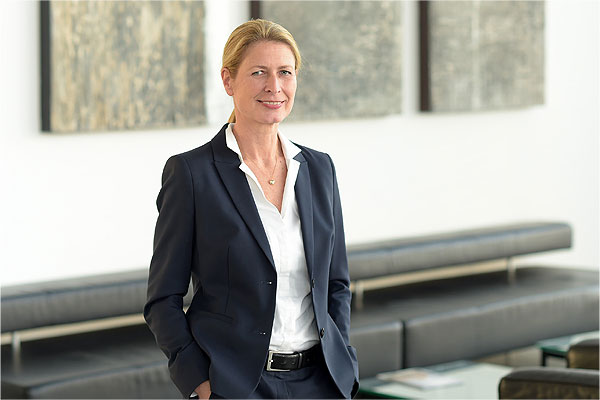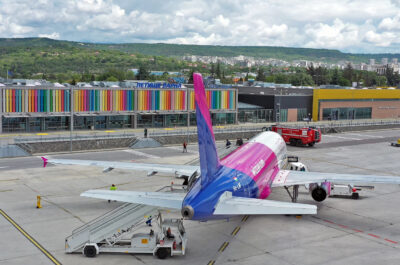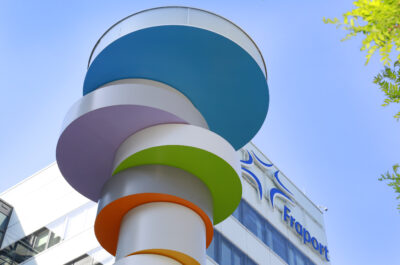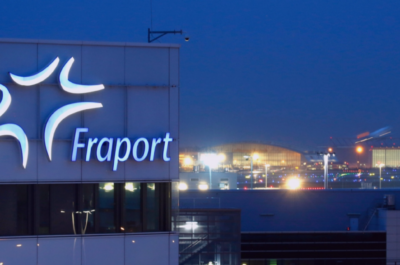
Julia Kranenberg.
Fraport intensifies climate commitment for carbon-free operations across the Group by 2045. Long-term growth perspective remains intact.
The Covid-19 pandemic continued to impact Fraport AG’s financial performance in fiscal year 2021 (ended Dec. 31). Nevertheless, Fraport increased its revenue and operating result (EBITDA) year-on-year, despite the ongoing volatile market environment. This positive trend was mainly supported by the company’s strict cost management and by the ongoing traffic recovery during the second half of 2021 – in Frankfurt, and particularly at the Group’s airports worldwide. The Group result (net profit) moved clearly back into positive territory, reaching 91.8 million euros at year-end 2021 (2019: minus 690.4 million euros).
Fraport AG’s CEO, Dr. Stefan Schulte, commented: “We have used the past year to further increase our competitiveness, thus strengthening Fraport’s position for future growth. We have realigned our company by implementing strict cost management and, where necessary, adopting immediate personnel-reduction measures – in response to noticeably lower traffic volumes now. Fraport has become a leaner and more efficient company than before the pandemic. This will be a decisive factor for our future success, while also entailing even greater flexibility – also in view of the current geopolitical situation. A look at the current flight bookings situation gives cause for optimism. The booking figures clearly underscore that people are eager to travel again. For this reason, we are now focusing on ramping up operations. This includes plans to recruit up to 1,000 operational staff in 2022. At the same time, we are intensifying our climate goals. Our aim is to become carbon free by 2045 – in Frankfurt, as well as at all our Group airports worldwide.”
Positive financial performance largely driven by traffic growth
Global travel restrictions still dampened passenger demand in the beginning months of 2021. Traffic first picked up again noticeably during the summer. A total of 24.8 million passengers traveled via Frankfurt Airport (FRA) in 2021, representing an increase of 32 percent year-on-year (2019: down 65 percent). Most of the airports in Fraport’s international portfolio also benefited from people’s renewed desire to travel to warm-weather destinations – with some Group airports seeing significant passenger growth. In October 2021, traffic nearly reached pre-crisis levels at the Greek airports and Antalya Airport on the Turkish Riviera. Across the Group, traffic growth rates ranged between 31 percent at Ljubljana Airport and 126 percent in Antalya, year-on-year. Cargo throughput at Frankfurt Airport (comprising airfreight and airmail) also continued to grow in 2021. Despite the lack of belly capacity on passenger aircraft, FRA even hit a new record for cargo traffic in fiscal 2021. This underscores Frankfurt’s vital role as one of the leading cargo hubs in Europe. Reflecting Fraport’s overall positive traffic performance, Group revenue rose by 27.8 percent year-on-year to 2.14 billion euros. Adjusted for revenue from construction and expansion measures at Fraport’s subsidiaries worldwide (in line with IFRIC 12), Group revenue grew by 30.9 percent to 1.90 billion euros.
Driven by revenue growth and a further significant reduction in operating expenses, Group EBITDA (earnings before interest, taxes, depreciation and amortization) clearly climbed back to positive territory in fiscal 2021, reaching 757.0 million euros (2019: minus 250.6 million euros). This growth was also supported by crisis-related compensation payments and other pandemic compensation granted by governments – totaling around €320 million. Group EBIT also increased markedly to 313.7 million euros (2019: minus 708.1 million euros). The Group result (net profit) recovered from a loss of €690 million recorded in 2020 (the first pandemic year) to a gain of 91.8 million euros in 2021.
Cost reductions enable Fraport to focus on ramping up operations
In mid-year 2021, Fraport already achieved its self-set goal of reducing personnel expenses at Frankfurt. By then, about 4,300 jobs were cut in a socially responsible manner, leading respectively to reduced staff costs. Further savings were achieved by implementing short-time work for employees (under Germany’s “Kurzarbeit” progam). However, “Kurzarbeit” only applied to non-operational staff at Frankfurt throughout the full-year 2021. For operational staff, short-time work was gradually reduced in the course of the year in tandem with the ramp-up of airport operations. In addition, Fraport started recruiting operational staff again.
Strict cost management and ongoing Group development
Fraport implemented measures to counter the pandemic crisis at a very early stage. Because these measures have proven effective, the Group is now focusing on streamlining processes and aligning organizational structures to further increase efficiencies. In addition, the company will continue its strict cost-management policy, by reducing or deferring all investments unessential for maintaining operations. At the same time, Fraport continues to pursue important strategic investments for the future, such as the construction of Frankfurt Airport’s new Terminal 3. On the site of the new terminal, the largely completed Pier G is being put into inactive standby mode. Should strong passenger demand require additional capacity, Pier G – which is scheduled to open in 2026 – could be taken into operation ahead of schedule on a flexible basis, requiring a minimum twelve-month preparation period.
Fraport accelerates sustainability goals
Despite the ongoing business challenges in the second pandemic year, Fraport set the course in 2021 for an even more ambitious climate goal. The airport operator has committed to becoming carbon free at all of its locations across the Group by 2045. This commitment comprises an extensive package of measures to be adopted at the Group’s home-base Frankfurt Airport, but also serving as a guideline for Fraport’s Group airports worldwide. Fraport’s climate package explicitly excludes measures that merely offset carbon.
In Frankfurt, Fraport has been purchasing electricity from existing onshore wind turbines since July 2021. Another milestone followed in December last year with the signing of an agreement between Fraport and energy provider EnBW. Under this agreement, EnBW will supply some 85 megawatts of electricity per year to Frankfurt Airport from an offshore wind park, starting in 2026. Other Fraport measures include increasing the use of photovoltaic arrays for generating electricity, switching incrementally to renewables to power the vehicle fleet, as well as a number of other improvements to enhance energy efficiency.
Outlook
For the current 2022 business year, Fraport’s Executive Board expects traffic at Frankfurt Airport to range between approximately 39 million and 46 million travelers – equaling 55 to 65 percent of the pre-crisis 2019 passenger level. Group revenue is projected to reach about 3 billion euros. Group EBITDA is expected to range between 760 million euros and 880 million euros, while Group EBIT is forecast to rise to between 320 million euros and 440 million euros. The Group result (net profit) is expected to reach between 50 million euros and 150 million euros. The current geopolitical situation has already been factored into this outlook to the extent now possible, given all the uncertainty.
Julia Kranenberg appointed as Fraport AG’s future Executive Board Member for HR
Julia Kranenberg will be joining Fraport AG’s Executive Board as the new board member responsible for Human Resources (HR) and as the Executive Director Labor Relations. This was decided by the company’s Supervisory Board in its meeting on March 14. She will succeed Michael Müller, who is set to retire on grounds of age on September 30, 2022.
Ms Kranenberg joined Essen-based energy company RWE in 2007, where she held various HR management positions. After RWE split its operations into separate companies, she joined Innogy SE in 2016. Serving as the head of HR Development and Top Executive Management for the entire Innogy Group, she was responsible for the development of the 40,000 employees and managers – including HR management for senior executives.
Following the subsequent acquisition of Innogy by the E.ON Group, Kranenberg played a key role from April 2018 onward in integrating the HR activities of both companies. In March 2020, she moved to Avacon AG to assume executive responsibilities for HR, along with purchasing, property and environmental safety.
Fraport AG’s future executive board member Julia Kranenberg is married and has a 10-year-old son.
Michael Boddenberg, Fraport AG Supervisory Board Chairman and Minister of Finance of Hesse, underscored that he was very satisfied with the executive selection. “We got to know many high-caliber business leaders, but ultimately Julia Kranenberg stood out because of her diverse experience gained in a large infrastructure company, where she supported a range of transformation processes. I was also impressed by her straightforward professional and human approach.”
Boddenberg also praised the services of the outgoing Executive Director Labor Relations: “With Michael Müller’s departure, Fraport AG is losing an outstanding leader who, with his almost 40 years of airport experience, played a key role in making Fraport AG the success that it is today. In particular, safeguarding the interests of employees – both in good times and during the aviation industry’s years of crisis – was always a matter close to his heart. I would like to thank Mr. Müller for his outstanding work, dedication and cooperation and wish him all the best and God’s blessings for the future.”
Michael Müller joined Fraport’s Executive Board in October 2012. Since then, he has held board responsibility for Ground Services, Human Resources and Internal Auditing. In 1984, Mr. Müller joined FAG, as the Frankfurt Airport operating company was formerly called. From 1993, he held a range of executive HR roles. A graduate in economics, Müller was appointed head of Human Resources in 1997. In 2009, he was appointed head of Ground Services at Fraport AG.
Vicky is the co-founder of TravelDailyNews Media Network where she is the Editor-in Chief. She is also responsible for the daily operation and the financial policy. She holds a Bachelor's degree in Tourism Business Administration from the Technical University of Athens and a Master in Business Administration (MBA) from the University of Wales.
She has many years of both academic and industrial experience within the travel industry. She has written/edited numerous articles in various tourism magazines.






























































































































































































































